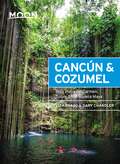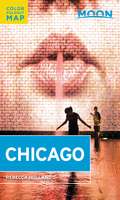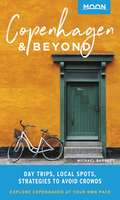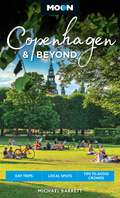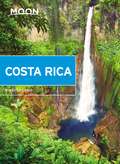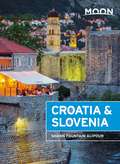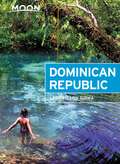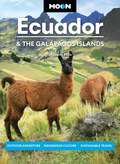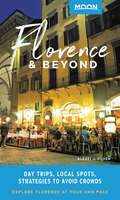- Table View
- List View
Moon Canadian Rockies: Including Banff & Jasper National Parks (Travel Guide)
by Andrew HempsteadFind Your Adventure with Moon Travel Guides! Snowy peaks, icy glaciers, glittering lakes, and alpine meadows: answer the call of the wild with Moon Canadian Rockies. Strategic, flexible itineraries from day hikes to a two-week Canadian Rockies road trip, designed for outdoor adventurers, families, winter sports enthusiasts, and moreActivities and ideas for every traveler: Hike to incredible vistas and try to spot moose, bighorn sheep, and black bears. Ride over a glacier in an Ice Explorer, float through the sky in a mountain gondola, or white-water raft down rivers of snowmelt. Browse the museums and boutiques of downtown Banff, or go horseback riding though the Tonquin Valley. Indulge in fine French cuisine and spend the night in a luxurious mountain lodge, or fish for your own fresh dinner and camp under the starsLocal insight from Canadian Rockies expert Andrew Hempstead on when to go, what to do, where to stay, and how to get aroundFull-color photos and detailed maps and directions, including driving times and mileageIn-depth coverage of Banff National Park, Kootenay National Park, Yoho National Park, Jasper National Park, Waterton Lakes National Park, and nearby gateway cities of Banff, Canmore, Jasper, Calgary, Radium Hot Springs, Invermere, Golden, and Kananaskis CountryBackground information on the landscape, culture, history, and environmentWith Moon Canadian Rockies' practical tips, myriad activities, and an insider's view on the best things to do and see, you can plan your trip your way.Expanding your trip? Try Moon Vancouver & Canadian Rockies Road Trip. Sticking to one park? Check out Moon Banff National Park or Moon Glacier National Park.
Moon Cancún & Cozumel: With Playa del Carmen, Tulum & the Riviera Maya (Travel Guide)
by Gary Chandler Liza PradoWhite sands and turquoise seas, cenotes and ruins, relaxation and adventure: dive in with Moon Cancún & Cozumel. Inside you'll find:Strategic itineraries from a Cozumel getaway to a week touring the length of the Riviera Maya, designed for families, honeymooners, ecotourists, history buffs, and adventurersThe top attractions and unique experiences: Wander the ancient ruins of Chichén Itzá or climb the second-highest Maya pyramid at Cobá. Kayak through mangrove forests, snorkel with whale sharks, and dive into pristine coral reefs full of sea life. Sunbathe on the best beaches of Cancún with a margarita, indulge in a picnic of tacos and empanadas, or dance the night away in a vibrant clubThe best spots for sports and recreation, including sailing, fishing, kayaking, mountain biking, kiteboarding, and diving or snorkeling in reefs and in eerily beautiful underground cenotesHonest advice from seasoned adventurers Gary Chandler and Liz Prado on when to go, how to get around, and where to stay, from backpacker hostels and beachy bungalows to high-end luxury resortsDetailed maps and full-color photos throughoutThorough information on the landscape, climate, wildlife, and local culture, including a Spanish phrasebookFull coverage of Cancún, Isla Cozumel, Playa del Carmen and the Riviera Maya, Tulum and the Costa Maya, and Chichén ItzáWith Moon Cancún & Cozumel's practical tips and local insight, you can plan your trip your way.Expanding your trip? Check out Moon Yucatán Peninsula or Moon Belize.
Moon Charleston & Savannah (Travel Guide)
by Jim MorekisWhether you're relaxing on a romantic beach, soaking up the rich history, or reveling in the Southern hospitality, dig into these fun-loving sister cities with Moon Charleston & Savannah.Explore the Cities: Navigate by neighborhood or by activity with color-coded maps of both Charleston and SavannahSee the Sights: Browse the museums on Savannah's historic River Street, take a carriage ride through Charleston's French Quarter, or check out the wares at the Old City Market. Visit Civil War battlefields, check out the First African Baptist Church, and learn about the area's important African American historyGet a Taste of the South: Sample classic shrimp and grits, juicy barbecue, or seafood straight off the boat. Savor innovative cuisine at James Beard Award-winning restaurants, and discover up-and-coming spots focusing on local, sustainable ingredientsBars, Entertainment, and Nightlife: Watch the sunset from a rooftop bar, see what's on tap at a craft brewery, or mingle with the locals at a French Quarter dive. Catch a live gig from the next big indie band, sip swanky artisan cocktails, or indulge in Savannah's to-go cup tradition on a stroll through the Historic DistrictHonest Advice: Jim Morekis was born and raised in Savannah and shares his local insight into these beautiful citiesItineraries and Day Trips: Follow itineraries designed for families, beach lovers, history buffs, foodies, and more, and get outside the city with full chapters on Hilton Head and the Lowcountry and the Golden IslesFull-Color Photos and Detailed MapsHandy Tools: Background information on the area's landscape, history, and culture, tips on getting there and getting around, and advice for travelers with disabilities, families with children, seniors, and LGBTQ+ travelersWith Moon's practical tips and local know-how, you can experience Charleston and Savannah your way.Hitting the road? Try Moon Blue Ridge Parkway Road Trip. Exploring more of the South? Try Moon Coastal Carolinas or Moon Asheville & the Great Smoky Mountains.Special ebook features:Easily navigate listings with quick searches, plus website links and zoom-in maps and imagesPersonalize your guide by adding notes and bookmarks
Moon Charleston & Savannah (Travel Guide)
by Jim MorekisWhether you're relaxing on a romantic beach, soaking up the rich history, or reveling in the Southern hospitality, dig into these fun-loving sister cities with Moon Charleston & Savannah.Explore the cities: Navigate by neighborhood or by activity with color-coded maps of both Charleston and SavannahSee the sights: Browse the museums on Savannah's historic River Street, take a carriage ride through Charleston's French Quarter, or check out the wares at the Old City Market. Visit Civil War battlefields, check out the First African Baptist Church, and learn about the area's important African American historyGet a taste of the South: Sample classic shrimp and grits, juicy barbecue, or seafood straight off the boat. Savor innovative cuisine at James Beard Award-winning restaurants, and discover up-and-coming spots focusing on local, sustainable ingredientsBars, entertainment, and nightlife: Watch the sunset from a rooftop bar, see what's on tap at a craft brewery, or mingle with the locals at a French Quarter dive. Catch a live gig from the next big indie band, sip swanky artisan cocktails, or indulge in Savannah's to-go cup tradition on a stroll through the Historic DistrictHonest advice: Jim Morekis was born and raised in Savannah and shares his local insight into these beautiful citiesItineraries and day trips: Follow itineraries designed for families, beach lovers, history buffs, foodies, and more, and get outside the city with full chapters on Hilton Head and the Lowcountry and the Golden IslesHelpful resources on COVID-19 and traveling to Charleston and SavannahFull-color photos and detailed mapsHandy tools: Background information on the area's landscape, history, and culture, tips on getting there and getting around, and advice for travelers with disabilities, families with children, seniors, and LGBTQ+ travelersWith Moon's practical tips and local know-how, you can experience the best of Charleston and Savannah.Hitting the road? Try Moon Blue Ridge Parkway Road Trip or Moon U.S. Civil Rights Trail. About Moon Travel Guides: Moon was founded in 1973 to empower independent, active, and conscious travel. We prioritize local businesses, outdoor recreation, and traveling strategically and sustainably. Moon Travel Guides are written by local, expert authors with great stories to tell—and they can't wait to share their favorite places with you.For more inspiration, follow @moonguides on social media.
Moon Charleston & Savannah: Coastal Getaways, Southern Cuisine, History & Architecture (Moon U.S. Travel Guide)
by Jim Morekis Moon Travel GuidesWhether you're relaxing on a beach, soaking up rich history, or reveling in Southern hospitality, dig into these fun-loving sister cities with Moon Charleston & Savannah.Explore the cities: Navigate by neighborhood or by activity with helpful maps of both Charleston and Savannah See the sights: Browse the museums on Savannah's historic River Street and take a carriage ride through Charleston's French Quarter. Check out the wares at the Old City Market, visit the First African Baptist Church, and learn about the area's important African American history Get a taste of the South: Sample classic shrimp and grits, juicy barbecue, or seafood straight off the boat. Savor innovative cuisine at award-winning restaurants, and discover up-and-coming spots focusing on local, sustainable ingredients Bars, entertainment, and nightlife: Watch the sunset from a rooftop bar, see what's on tap at a craft brewery, or mingle with the locals at a French Quarter dive. Catch a live gig from the next big indie band, sip swanky artisan cocktails, or indulge in Savannah's to-go cup tradition on a stroll through the Historic District Local advice: Jim Morekis was born and raised in Savannah and shares his insight into these beautiful cities Flexible itinerary and day trips: Follow a 10-day itinerary to see the best of Charleston & Savannah, and get outside the cities with full chapters on Hilton Head, the Lowcountry, and the Golden IslesFull-color photos and detailed mapsHandy tools: Background information on the area's landscape, history, and culture, tips on getting there and getting around, and advice for travelers with disabilities, families with children, seniors, and LGBTQ+ travelers Experience the best of Charleston and Savannah with Moon's practical tips and local know-how. Hitting the road? Try Moon Blue Ridge Parkway Road Trip. Exploring more of the South? Try Moon Asheville & the Great Smoky Mountains.About Moon Travel Guides: Moon was founded in 1973 to empower independent, active, and conscious travel. We prioritize local businesses, outdoor recreation, and traveling strategically and sustainably. Moon Travel Guides are written by local, expert authors with great stories to tell—and they can't wait to share their favorite places with you. For more inspiration, follow @moonguides on social media.
Moon Charleston: With Hilton Head & the Lowcountry (Travel Guide)
by Jim MorekisGet to know Charleston's fun-loving lifestyle, soak up its gothic architecture, and revel in its classic Southern charm with Moon Charleston.Explore the City: Navigate by neighborhood or by activity, with color-coded maps of Charleston's most interesting areasSee the Sights: Take a guided tour of Fort Sumter or visit the house where Harriet Tubman worked as a nurse. Admire antebellum architecture on the oldest street in the city or stroll along the harbor's Waterfront Park. Check out the evocative old churches and gothic cemeteries in the French Quarter, or do a little shopping along bustling King StreetGet a Taste of the City: Sample freshly-caught seafood, home-style Southern cooking, and the smokiest slabs of barbecue aroundBars and Nightlife: Kick back with locals at a dive bar, sip cocktails at a five-star restaurant, or explore the hip Upper King neighborhoodHonest Advice: Charleston expert Jim Morekis shares his insider tipsItineraries and Day Trips: Follow itineraries designed for families, beach lovers, history buffs, foodies, and more, and get outside the city to Hilton Head and the LowcountryFull-Color Photos and Detailed MapsHandy Tools: Background information on Charleston's landscape, history, and culture, tips on getting there and getting around, and advice for travelers with disabilities, families with children, seniors, and LGBTQ+ travelersWith Moon Charleston's local know-how and practical advice, you can plan your trip your way.Hitting the road? Try Moon Blue Ridge Parkway Road Trip. Seeing more southern cities? Try Moon Atlanta or Moon Savannah.
Moon Chicago (Travel Guide)
by Rebecca HollandSee the City with a Local with Moon Travel Guides!Moon Chicago reveals the Windy City's perfect mix of cosmopolitan culture and Midwestern charm. Explore the City: Navigate by neighborhood or by activity with color-coded maps, or follow turn-by-turn directions for a self-guided neighborhood walkSee the Sights: Relax with the manta rays at Shedd Aquarium, listen to live music at Millenium Park, or take in some modern sculpture at the Art Institute. Venture onto the glass skydeck of the 110-story Willis Tower, or take a river tour of Chicago's historic architecture. Ride the Navy Pier Ferris Wheel, cheer on the Cubs at Wrigley Field, or grab a picnic basket, kick off your shoes, and watch the waves on Lake MichiganGet a Taste of the City: Sample Chicago beef at a classic steakhouse, grab a gourmet hot dog, or pick from dozens of high-end farm-to-table restaurants (but don't forget to try the deep-dish pizza!)Bars and Nightlife: Kick back at an authentic speakeasy before taking in a jazz show, or visit the famous Second City improv comedy club, where many of Saturday Night Live's stars got their startTrusted Advice: Local journalist and world traveler Rebecca Holland shares the secrets of her favorite cityItineraries and Day Trips: All accessible by bus, train, or public transit, including "A Winter Day in Chicago," "Chicago with Kids," and a week-long "Best of Chicago" plan Expert Tips: The best views, people-watching spots, romantic places, international cuisine, and more, plus advice for LGBTQ visitors, families with children, travelers with disabilities, and international visitorsMaps and Tools: Background information on Chicago's history and culture, as well as full-color photos and an easy-to-read foldout map to use on the goWith Moon Chicago's practical tips, unique experiences, and local know-how, you can plan your trip your way. Looking to experience more world-class cities? Try Moon Seattle or Moon Washington DC. Is Chicago just the first stop on a bigger adventure? Check out Moon Route 66 Road Trip.
Moon Cleveland (Travel Guide)
by Douglas TrattnerExperience a city with Rust Belt roots and a vibrant, creative spirit with Moon Cleveland. Inside you'll find: Explore the City: Navigate by neighborhood or by activity, with color-coded maps of Cleveland's most interesting neighborhoodsSee the Sights: Root for the Cleveland Indians at "The Jake," check out the legendary costumes, instruments, and handwritten lyrics at the Rock & Roll Hall of Fame, admire industrial-era mansions, or check out the Museum of Contemporary ArtGet a Taste of the City: Dine at a trattoria in Little Italy, savor fresh fare at farm-to-table restaurants, sample falafel, pierogis, local cheeses and more at the Westside Market, and relax with a pint at a craft breweryBars and Nightlife: Catch a performance at the House of Blues, play bocce ball in an Irish pub, polka-dance at a popular local happy hour, or sip craft cocktails in a historic loungeLocal Advice: Douglas Trattner shares insider know-how on the city he calls homeItineraries and Day Trips: Explore nearby Lake Erie, Akron, and Amish Country, or follow city itineraries designed for long weekends, rainy days, and moreHandy tools like full-color photos, detailed maps, and background information on the history and culture of ClevelandWith Moon Cleveland's practical tips and local insight, you can experience the city your way.Exploring more Midwest cities? Check out Moon Chicago or Moon Minneapolis & St. Paul.
Moon Coastal Maine: With Acadia National Park (Travel Guide)
by Hilary NangleExperience the best of Maine's spruce-studded islands, classic shoreline villages, and rugged character with Moon Coastal Maine. Inside you'll find:Strategic, flexible itineraries like a long weekend Down East, five days in Acadia, and a two-week road trip, designed for history buffs, foodies, beach-goers, outdoor adventurers, and moreMust-see highlights and unique experiences: Bike through timberland forests or take a lighthouse cruise down the Kennebec River. Sample wild blueberries, farmstead cheeses, and preserves from roadside farm stands, find the best beachfront lobster shack, or mingle with locals over a "chowdah suppah." Discover maritime history in a traditional fishing village or explore pedestrian-only islands packed with hiking trails. Watch the boats sway in a quiet harbor, unwind on a sandy pocket beach sandwiched between two headlands, or immerse yourself in the secluded wilderness of Mount Desert Island and Acadia National ParkHonest insight from Maine native Hilary Nangle on when to go, where to eat, and where to stay, from budget campgrounds to historic inns Full-color photos and detailed maps throughoutRecommendations for getting there and getting around by plane, car, train, or busThorough background on the culture, environment, wildlife, and historyWith Moon's practical tips and local know-how, you can experience the best of coastal Maine.Exploring inland? Try Moon Maine. Hitting the road? Check out Moon New England Road Trip.
Moon Coastal Oregon: Scenic Drives, Marine Wildlife, Historic Towns (Travel Guide)
by Moon Travel Guides Matt WastradowskiFrom stunning coastline to charming towns to wildlife watching, find your adventure with Moon Coastal Oregon. Inside you'll find:Flexible itineraries, including a weeklong road trip to experience the best of the Oregon Coast The top outdoor adventures: Go tidepooling, watch for migrating whales, and see hundreds of sea lions. Hike along epic coastal dunes, take a surfing lesson, and catch a sunset at iconic Haystack Rock. Join a fishing charter, camp beside the ocean, or take a jet boat tour to spot wildlife on the Rogue River. Can't-miss experiences and unique activities: Feast on fresh seafood in quaint seaside towns, check out Astoria's craft beer scene, or try tasty treats at the famous Tillamook cheese factory. Climb to the top of historic lighthouses, explore a shipwreck, and learn about local maritime history. Expert insight from Oregon local Matt Wastradowski on when to go, how to get around, and where to stay Full-color photos and detailed maps throughoutThorough background information on the culture, landscape, climate, and wildlife, plus handy recommendations for international visitors, families with kids, travelers of color, women travelers, and more With Moon's expert tips and local know-how, you can experience the best of Coastal Oregon. Exploring more of the state? Try Moon Oregon or Moon Columbia River Gorge & Mount Hood. Looking for outdoor adventure? Check out Moon Oregon Hiking.About Moon Travel Guides: Moon was founded in 1973 to empower independent, active, and conscious travel. We prioritize local businesses, outdoor recreation, and traveling strategically and sustainably. Moon Travel Guides are written by local, expert authors with great stories to tell—and they can't wait to share their favorite places with you. For more inspiration, follow @moonguides on social media.
Moon Columbia River Gorge & Mount Hood: Waterfalls & Wildflowers, Craft Beer & Wine, Hiking & Camping (Travel Guide)
by Matt WastradowskiWhether you're hiking past waterfalls and wildflowers or cruising past sweeping views of the Columbia River, experience the best of this wild corner of the country with Moon Columbia River Gorge & Mount Hood. Inside you'll find:Strategic, flexible itineraries, from day trips from Portland or weekend getaways from Vancouver to a road trip along the Fruit Loop, designed for outdoor adventurers, families, foodies and wine-lovers, and moreTop experiences, and things to do: Sip your way through Mount Hood's craft beer and wine scene while you take in views of the Gorge, sample fresh vegetables and cider from a local farm stand, or pick your own fruit for a picnic. Get an up-close look at the annual salmon run from the Bonneville Lock and Dam, and spend the night in the historic Timberline LodgeBest outdoor adventures for every season: Hike through fields of wildflowers and marvel at the towering cascades of Waterfall Alley. Make your way to the top of Beacon Rock for panoramic views of the Gorge, or hit the slopes of Mount Hood in the winter. Kayak or raft along the White Salmon River, soak in a hot spring surrounded by old-growth forest, and spend the night under the stars on the shores of a pristine lakeExpert advice on when to go, where to stay, and how to get around from seasoned outdoorsman and Bend local Matt WastradowskiHelpful resources on Covid-19 and traveling in OregonFull-color photos and detailed maps throughoutThorough background information on the landscape, climate, wildlife, and local cultureWith Moon Columbia River Gorge & Mount Hood's expert tips, local insight, and countless activities, you can plan your trip your way.Want more outdoor adventures in the PNW? Try Moon Pacific Northwest Hiking. About Moon Travel Guides: Moon was founded in 1973 to empower independent, active, and conscious travel. We prioritize local businesses, outdoor recreation, and traveling strategically and sustainably. Moon Travel Guides are written by local, expert authors with great stories to tell—and they can't wait to share their favorite places with you.For more inspiration, follow @moonguides on social media.
Moon Copenhagen & Beyond: Day Trips, Local Spots, Strategies to Avoid Crowds (Travel Guide)
by Michael BarrettWhether you're sipping coffee by a canal, exploring lavish palaces, or discovering the real meaning of hygge, get to know the Danish capital with Moon Copenhagen & Beyond.Explore In and Around the City: Meander through Copenhagen's most interesting neighborhoods, like the Inner City, Vesterbro, Nørrebro, and Christianshavn, and nearby areas, including Kronborg, Kongens Lyngby, Malmö, and moreGo at Your Own Pace: Choose from tons of itinerary options designed for foodies, history buffs, art lovers, and moreSee the Sights: Stroll cobbled streets and bike along picture-perfect canals, watch the changing of the guard at Amalienborg, picnic on the grounds of the Frederiksberg Palace, and spend an afternoon at the iconic old-school amusement park Tivoli GardensGet Outside the City: Visit the renowned art collection on the shores of the Øresund, unwind in the Swedish coastal city of Malmö, or stroll the old-fashioned fairground in Kongens LyngbySavor the Flavors: Snack on open-faced rugbrød (rye bread) sandwiches or delicious Danish pastries, sample Middle Eastern mezze or shawarma, or dine at Michelin-starred restaurantsExperience the Nightlife: From wine bars and craft cocktail lounges to thrifty bodegas and pop-up "Friday bars," dig into Copenhagen's vibrant nightlifeGet to Know the Real Copenhagen: Denmark local Michael Barrett shares his favorite spots in the cityFull-Color Photos and Detailed Maps throughout, plus a fold-out mapHandy Tools: Background information on the city's history and culture, plus tips on sustainable travel, what to pack, where to stay, and how to get aroundDay trip itineraries, favorite local spots, and strategies to skip the crowds: Take your time with Moon Copenhagen & Beyond.Want to experience more of Scandinavia? Try Moon Norway. Exploring more of Europe? Check out Moon Rome, Florence & Venice or Moon Barcelona & Madrid.
Moon Copenhagen & Beyond: Day Trips, Local Spots, Tips to Avoid Crowds (Moon Europe Travel Guide)
by Michael Barrett Moon Travel GuidesWhether you're sipping coffee by a canal, exploring regal palaces, or discovering the real meaning of hygge, get to know the Danish capital with Moon Copenhagen & Beyond. Inside you'll find:Strategic, flexible itineraries designed for visiting top sights and local favorites, whether you have a few days, a week, or longer Must-see highlights and unique experiences: Stroll cobbled streets and bike along picture-perfect canals. Watch the changing of the guard at Amalienborg, picnic on the grounds of the Frederiksberg Palace, or spend an afternoon at the iconic old-school amusement park Tivoli Gardens. Snack on open-faced rugbrød (rye bread) sandwiches or delicious Danish pastries and check out Copenhagen's vibrant nightlife Get outside the city: Escape the crowds with an easy day trip or short overnight stay. Visit the renowned art collection on the shores of the Øresund, unwind in the Swedish coastal city of Malmö, or stroll the old-fashioned fairground in Kongens Lyngby Trusted, expert advice from Copenhagen resident Michael Barrett Background information on the city's history and culture, plus handy tips for getting around, traveling sustainably, avoiding crowds, and supporting local businesses Full-color photos and detailed maps throughout, plus a fold-out mapIn-depth coverage of neighborhoods, like the Inner City, Vesterbro, Nørrebro, and Christianshavn, and nearby areas, including Kronborg, Kongens Lyngby, Malmö, and more Explore at your own pace and savor the city like a local with Moon Copenhagen & Beyond. Want to experience more of Scandinavia? Try Moon Norway. Exploring more of Europe? Check out Moon Iceland or Moon Rome, Florence & Venice.About Moon Travel Guides: Moon was founded in 1973 to empower independent, active, and conscious travel. We prioritize local businesses, outdoor recreation, and traveling strategically and sustainably. Moon Travel Guides are written by local, expert authors with great stories to tell—and they can't wait to share their favorite places with you. For more inspiration, follow @moonguides on social media.
Moon Costa Rica (Travel Guide)
by Nikki SolanoWhether you're zip-lining through cloud forests, relaxing on a wellness retreat, or swimming with manta rays, discover the real pura vida with Moon Costa Rica. Inside you'll find:Flexible, strategic itineraries designed for backpackers, beach-lovers, adventure travelers, honeymooners, and more, including the best beaches for swimming, sunsets, and seclusionThe best spots for eco-friendly outdoor adventures like kayaking, hiking, and scuba-diving: Swim under a waterfall, raft over rapids, explore mysterious caves, and cliff-dive into river pools. Hike to the summit of Mount Chirripó, the highest point in Costa Rica, snorkel with sea turtles in warm turquoise water, or soak in a volcanic mineral poolUnique and authentic experiences: Admire the forest floor from the middle of a hanging bridge, or take an aerial tram to lake, volcano, and ocean views. Relax on a pristine beach and watch the sunrise with a cup of flavorful local coffee. Fill up on fried plantains at a traditional soda, and shop at a neighborhood mercado Insight from Cartago local Nikki Solano on how to experience Costa Rica like an insider, support local and sustainable businesses, avoid crowds, and respectfully engage with the cultureFull-color photos and detailed maps throughoutBackground information on Costa Rica's landscape, history, and cultural customs, as well as volunteer opportunities Handy tools including a Spanish phrasebook, packing suggestions, and travel tips for disability access, solo travelers, seniors, and LGBTQ travelersWith Moon's practical tips and local know-how, you can experience Costa Rica your way.Exploring more of Central America? Check out Moon Belize.
Moon Croatia & Slovenia (Travel Guide)
by Shann Fountain AlipourSun-drenched villages and warm beaches, thick forests and snow-capped mountains: Immerse yourself in a postcard come to life with Moon Croatia & Slovenia. Inside you'll find: Flexible itineraries from one week in each country to two weeks in both, including a side trip to Montenegro, plus how to make the most of short stays in Zagreb, Dubrovnik, and LjubljanaStrategic advice for history buffs, outdoor adventurers, foodies, island-hoppers, families with kids and more Suggestions for a Dalmatian Islands getaway and other day trips to escape the city crowds Must-see highlights and unique experiences: Go truffle hunting in Istria or taste homemade vintages on an ancient wine route. Walk along the creamy stone and red-tiled roofs inside Dubrovnik's 15th-century walls or wander through Ljubljana's historic Tivoli Park. Leave crowded beaches behind and hire a boat to explore lesser-known islands. Wind your way up snowy Mount Sljeme, hike to caves and waterfalls in Croatia's Plitvice Lakes National Park or go rafting in Slovenia's Soca RiverExpert insight on when to go, what to do, and where to stay from former Zagreb local Shann Fountain AlipourFull-color photos and detailed maps throughoutBackground information on the landscape, history, and cultural customs of each countryHandy tools such as visa information, Croatian, Slovenian, and Montenegrin phrasebooks, and insider tips for traveling with children, as a senior, and moreExperience Croatia & Slovenia your way with Moon's practical tips and local insight.Looking for more sunshine? Try Moon Amalfi Coast or Moon Milan & the Italian Lakes. Heading East? Check out Moon Prague, Vienna & Budapest.
Moon Denver, Boulder & Colorado Springs (Travel Guide)
by Mindy SinkWorld-class breweries, rugged mountain peaks, and a funky college town: dive into the diversity of the Front Range with Moon Denver, Boulder & Colorado Springs. Inside you'll find:Flexible itineraries, from a week exploring Denver, Boulder, and Colorado Springs to day trips to nearby ski resorts and Rocky Mountain National ParkStrategic advice for outdoor adventurers, culture and history buffs, foodies, and moreMust-see highlights and unique experiences: Check out a new exhibit at the Denver Art Museum, catch a performance under the open sky at Red Rocks Amphitheatre, or explore the Wild West at the Museum of the American Cowboy. Ski the fresh powder at Loveland or Winter Park and relax with an après-ski drink. Go rafting on the Cache La Poudre river, rock-climb in the Flatirons, or hike slickrock trails to stunning mountain vistas. Savor fresh flavors at a farm-to-table restaurant, try gourmet treats at a buzzing public market, or chat with locals over a delicious microbrewHonest advice from Denver local and lifelong adventurer Mindy Sink on when to go, where to eat, and where to stayFull-color photos and detailed maps throughoutFocused coverage of Denver, Boulder, Colorado Springs, Fort Collins, Golden, and the East Side of Rocky Mountain National ParkThorough background on the culture, weather, wildlife, and historyFind your adventure with Moon Denver, Boulder & Colorado Springs.Exploring beyond the Mile-High City? Try Moon Colorado. Sticking to the park? Pick up Moon Rocky Mountain National Park.
Moon Denver, Boulder & Colorado Springs: Getaways, Outdoor Recreation, Bites & Brews (Travel Guide)
by Mindy SinkWorld-class breweries, rugged mountain peaks, and funky college town vibes: dive into the diversity of the Front Range with Moon Denver, Boulder & Colorado Springs. Inside you'll find:Flexible itineraries, like a week exploring Denver, Boulder, and Colorado Springs and day trips to nearby ski resorts and Rocky Mountain National Park The top outdoor adventures: Go rafting on the Cache La Poudre river, rock-climb in the Flatirons, or hike slickrock trails to stunning mountain vistas. Ski the fresh powder at Loveland or Winter Park and relax with an après-ski drink Must-see highlights and unique experiences: Check out a new exhibit at the Denver Art Museum, catch a performance under the open sky at Red Rocks Amphitheatre, or explore the Wild West at the Museum of the American Cowboy The best local flavors: Indulge in the offerings of a farm-to-table restaurant, try gourmet treats at a buzzing public market, or chat with locals over a delicious microbrew Honest advice from Denver local and lifelong adventurer Mindy Sink on when to go, where to eat, and where to stay Full-color photos and detailed maps throughoutFocused coverage of Denver, Boulder, Colorado Springs, Fort Collins, Golden, and the east side of Rocky Mountain National Park Thorough background on local culture, weather, health and safety, wildlife, and history Find your adventure with Moon Denver, Boulder & Colorado Springs. Exploring beyond the Mile-High City? Try Moon Colorado. Sticking to the park? Pick up Moon Rocky Mountain National Park. About Moon Travel Guides: Moon was founded in 1973 to empower independent, active, and conscious travel. We prioritize local businesses, outdoor recreation, and traveling strategically and sustainably. Moon Travel Guides are written by local, expert authors with great stories to tell—and they can't wait to share their favorite places with you. For more inspiration, follow @moonguides on social media.
Moon Dominican Republic (Travel Guide)
by Lebawit Lily GirmaDiamond white beaches, countrywide carnivals, and irresistible music: discover why so many have fallen head-over-heels for the DR. Inside Moon Dominican Republic you'll find:Flexible itineraries including the best of the Dominican Republic in 10 days, plus roundups of the best beaches, spots for diving and snorkeling, outdoor adventures, and moreStrategic advice for honeymooners, foodies, night owls, and more, whether you're in the DR for a few days or a few weeksThe top activities and unique experiences: Don a mask and join in the frenzy of Carnival or dance the night away to live merengue. Visit a cacao plantation or organic coffee farm, snack on fried plantains or a breakfast of mangú, and explore the bustling markets. Stroll along cobblestone streets and admire 16th-century churches, palaces, courthouses, and statues or take a community tour for a deeper understanding of local lifeOutdoor adventures: Enjoy miles of sand and clear water for sunbathing, swimming, and playing in the waves. Hike to hidden waterfalls or zipline through the forest. Dive to shipwrecks, snorkel alongside spotted eagle rays, or try kitesurfingWays to respectfully engage with culture from DR-insider Lebawit Lily Girma, from supporting small businesses to exploring ethically and sustainablyFull-color photos and detailed maps throughoutThorough background on the landscape, wildlife, history, government, and cultureHandy tools including a Spanish phrasebook, health and safety tips, visa information, and advice for LGBTQ, senior, and solo travelersWith Moon Dominican Republic's practical advice and local insight, you can find your adventure.Craving more of the Caribbean? Try Moon Bahamas or Moon Aruba.
Moon Ecuador & the Galápagos Islands (Travel Guide)
by Bethany PittsCanoe through the Amazon, explore the bustling capital of Quito, snorkel in the Galápagos, or kick back on the coast: Embark on an unforgettable adventure with Moon Ecuador & the Galápagos Islands. Inside you'll find:Flexible itineraries for spending time in the Sierras, the Amazon, the coast, Quito, and the Galápagos IslandsStrategic advice for ethical travelers, adventure lovers, budget travelers, history and culture buffs, wellness seekers, and moreMust-see highlights and unique experiences: Hike through the Amazon rainforest, paddle across lily-covered lagoons, and spot camian, tapir, or pink river dolphins. Dive with hammerhead sharks in the Galápagos, cycle the epic waterfall route in Baños, and watch the sun rise over the peaks where the Amazon meets the Andes. Wander cobbled colonial streets and gaze up at snow-capped volcanoes rising from wildflower-strewn grasslands. Take a surfing lesson in Montañita, and relax on the beach with a mojito in hand How to ethically experience Ecuador like an insider, support local and sustainable businesses, and respectfully engage with the indigenous communities, including those with shamanic traditions Expert insight from local author Bethany Pitts on where to eat, how to get around, where to stay, and how to avoid crowds Full-color photos and detailed maps throughout Reliable background on the landscape, climate, wildlife, and history, as well as health and safety advice, environmental issues, and common customs and etiquette Handy tools including a Spanish phrasebook, volunteer opportunities, packing suggestions, and travel tips for families with kids, seniors, travelers with disabilities, and LGBTQ travelersWith Moon Ecuador & the Galápagos Islands' practical tips and local know-how, you can plan your trip your way.Exploring more of South America? Check out Moon Chile or Moon Colombia.
Moon Ecuador & the Galápagos Islands: Outdoor Adventure, Indigenous Culture, Sustainable Travel (Moon Latin America & Caribbean Travel Guide)
by Bethany Pitts Moon Travel GuidesCanoe through the Amazon, explore the bustling capital of Quito, snorkel in the Galápagos, or kick back on the coast: Embark on an unforgettable adventure with Moon Ecuador & the Galápagos Islands. Inside you'll find:Flexible itineraries for spending time in the Sierras, the Amazon, the coast, Quito, and the Galápagos Islands Must-see highlights and unique experiences: Hike through the Amazon rainforest, paddle across lily-covered lagoons, and spot camian, tapir, or pink river dolphins. Dive with hammerhead sharks in the Galápagos, cycle the epic waterfall route in Baños, and watch the sun rise over the peaks where the Amazon meets the Andes. Wander cobbled colonial streets and gaze up at snow-capped volcanoes rising from wildflower-strewn grasslands. Take a surfing lesson in Montañita, and relax on the beach with a mojito in hand How to ethically experience Ecuador like an insider, support local and sustainable businesses, and respectfully engage with the indigenous communities, including those with shamanic traditions Expert insight from local author Bethany Pitts on what to eat, how to get around, where to stay, and how to avoid crowds Full-color photos and detailed maps throughout Reliable background on the landscape, climate, wildlife, and history, as well as health and safety advice and common customs and etiquette Handy tools including a Spanish phrasebook, volunteer opportunities, packing suggestions, and travel tips for families with kids, seniors, travelers with disabilities, and LGBTQ travelers With Moon Ecuador & the Galápagos Islands' practical tips and local know-how, you can plan your trip your way. Heading to Central America? Check out Moon Costa Rica. Sticking to the islands? Try Moon Galápagos Islands.About Moon Travel Guides: Moon was founded in 1973 to empower independent, active, and conscious travel. We prioritize local businesses, outdoor recreation, and traveling strategically and sustainably. Moon Travel Guides are written by local, expert authors with great stories to tell—and they can't wait to share their favorite places with you. For more inspiration, follow @moonguides on social media.
Moon Edinburgh, Glasgow & the Isle of Skye (Travel Guide)
by Sally CoffeyFrom sipping scotch and sampling haggis to touring castles and historic museums, make the most of your Scottish adventure with Moon Edinburgh, Glasgow & the Isle of Skye. Inside you'll find:Flexible itineraries such as one to three days in Edinburgh and Glasgow, two days in the Highlands, and four days on the Isle of Skye that can be expanded or combined into a longer trip, including day trips to Loch Lomond, Ben Nevis, and moreStrategic advice for art lovers, history buffs, road trippers, and moreExplore the Cities: Walk along Edinburgh's historic Royal Mile from the Edinburgh Castle to the Queen's Scottish Palace or climb the Arthur's Seat peak. Sample authentic haggis and dine at innovative new restaurants. Catch a traditional music performance in Glasgow (the UNESCO City of Music!) or chat with locals at a corner pub over folk music and a pintEscape the Crowds: Hike through wild moors and pine forests to deserted villages on Skye, sip your way through Islay's whisky distilleries, or take a seaplane over Loch Lomond for dramatic views of the HighlandsValuable perspective from Scotland expert Sally CoffeyFull-color photos and detailed maps throughoutBackground information on the landscape, history, and cultural customs of ScotlandHandy tools such as visa information, a glossary and list of Scottish phrases, and helpful tips for seniors, disability access, families with children, LGBTQ visitors, and travelers of colorWith Moon Edinburgh, Glasgow & the Isle of Skye's practical tips and local insight, you can plan your trip your way.Exploring beyond Scotland? Check out Moon London Walks or Moon Ireland.
Moon Egypt: Temples & Pyramids, Nile Sailing & Cruises, Desert Safaris (Moon Middle East & Africa Travel Guide)
by Moon Travel Guides Sarah SmierciakFrom the breathtaking sites of the ancient world to the colorful corals of the Red Sea, experience a land of treasures with Moon Egypt. Inside you'll find:Strategic, flexible itineraries including a one-week best of Egypt trip, a week of snorkeling, and moreCan't-miss experiences: Wander in the shadows of kings at Luxor&’s Karnak Temple and stroll the Avenue of Sphinxes. Marvel at the magnificent temple of Queen Hatshepsut, travel back in time at the Grand Egyptian Museum, or wind your way through colorful backstreet markets in search of the perfect handmade souvenir Outdoor adventures: Summit historic Mt. Sinai at dawn or spend an evening horseback riding near the Great Pyramid of Giza. Escape the chaos of Cairo on a felucca boat cruise or bike through the City of the Dead. Kayak the Nile and camp under the stars in the White Desert The best local flavors: Feast on traditional Egyptian street food, dig into fresh seafood in Alexandria, and indulge your sweet tooth with a plate of kunafa or basbousa Firsthand insight from Cairo resident and American expat Sarah Smierciak on how to experience the real Egypt and avoid crowds Full-color, vibrant photos throughoutDetailed maps and useful tips for navigating public transportation and taxis Thorough background information on the landscape, wildlife, history, government, culture, and local customs Handy tools including an Egyptian Arabic phrasebook and tips for accessibility, LGBTQ+ travelers, women traveling solo, and families with children Focused coverage of Cairo and Giza, the Northern and Southern Nile Valleys (including Luxor and Nubia), Alexandria, the Suez Canal, the Red Sea Coast, South Sinai, and the Western Desert With Moon's practical advice and insider tips, you can experience the best of Egypt. Want to see more of Northern Africa? Check out Moon Morocco.About Moon Travel Guides: Moon was founded in 1973 to empower independent, active, and conscious travel. We prioritize local businesses, outdoor recreation, and traveling strategically and sustainably. Moon Travel Guides are written by local, expert authors with great stories to tell—and they can&’t wait to share their favorite places with you. For more inspiration, follow @moonguides on social media.
Moon Florence & Beyond: Day Trips, Local Spots, Strategies to Avoid Crowds (Travel Guide)
by Alexei J. CohenWorld-famous galleries, medieval towers, bustling sidewalk cafés, and a culture steeped in artistic innovation: savor the best of Firenze at your own speed with Moon Florence & Beyond.Explore In and Around the City: Get to know Florence's most interesting neighborhoods like the historic center, Santa Croce, San Marco, and Santa Maria Novella, and nearby areas including Lucca, San Gimignano, Siena, Chianti, and moreGo at Your Own Pace: Choose from multiple itinerary options designed for foodies, history buffs, art lovers, and moreSee the Sights: Climb to the top of the gravity-defying Duomo, gaze at Michelango's David at the Accademia, see world-famous works at the Uffizi Gallery, or hike to the Basilica San Miniato al Monte for undisturbed views of the city skylineGet Outside the City: Escape the crowds and explore rolling Tuscan hill towns, the charming medieval city of Lucca, and the vineyards of ChiantiSavor the Flavors: Linger over an aperitivo at sunset, sample mouthwatering gelato, explore the city's burgeoning modern restaurant scene, or enjoy a traditional Florentine meal at an old-school trattoriaExperience the Nightlife: From a classic Negroni at an al fresco café to a swanky champagne bar or a neighborhood enoteca serving local Brunellos, find the best of Florence's many watering holesGet to Know the Real Florence: Follow local suggestions from Italian transplant Alexei CohenFull-Color Photos and Detailed MapsHandy Tools: Background information on Florentine history and culture, plus tips on sustainable travel, what to pack, where to stay, and how to get aroundDay trip itineraries, favorite local spots, and strategies to skip the crowds: Take your time with Moon Florence & Beyond.Exploring more of Italy? Check out Moon Venice & Beyond or Moon Milan & Beyond: With the Italian Lakes.
Moon Florida Gulf Coast (Travel Guide)
by Joshua Lawrence KinserWhether you're kayaking through mangroves, bodysurfing with manta rays, or sunbathing with a piña colada in hand, soak up the Sunshine State with Moon Florida Gulf Coast. Inside you'll find: Flexible itineraries from short beach getaways to a 10-day road trip covering all 700 miles of the Florida Gulf CoastStrategic advice for beach-goers, wildlife enthusiasts, water sports lovers, and moreThe best spots for outdoor adventures like kayaking, hiking, biking, bird-watching, and fishing, and the best beaches for swimming, sunsets, and seclusionTop activities and unique experiences: Discover the vibrant performing arts scene in Sarasota or stroll through quaint riverfront towns and secluded island enclaves. Unwind on shell-scattered beaches, explore winding mazes of mangroves, or spot gators in the swampy Everglades. Ride the coasters at Busch Gardens, browse art galleries in Naples, or check out a local swamp buggy race. Sail through the canals of Tampa, kick back at a beachfront oyster bar, and sip a local brew as the sun sets over the oceanExpert advice from Florida native Jason Ferguson on where to stay, where to eat, and how to get around by car, bus, or boatFull-color photos and detailed maps throughoutBackground information on the Gulf Coast's landscape, wildlife, history, and cultureHandy tips for international visitors, families with kids, LGBTQ travelers, and travelers with disabilitiesWith Moon Florida Gulf Coast's practical advice and local know-how, you can plan your trip your way.For more of the Sunshine State, try Moon Florida Keys. Hitting the road? Check out Moon South Florida & the Keys Road Trip.
Moon Florida Keys: With Miami & the Everglades (Travel Guide)
by Joshua Lawrence KinserFrom Miami to Loggerhead Key in the Dry Tortugas, get to know this free-spirited archipelago of beaches, palm trees, and fun with Moon Florida Keys. Inside you'll find:Flexible itineraries including a Key West getaway and a week-long road trip along the Overseas Highway, with coverage of Miami and an adventurous excursion into the EvergladesStrategic advice for water sports lovers, wildlife fanatics, families with kids, foodies, and moreUnique experiences and can't-miss sights: Explore the fascinating coral reefs and shipwrecks of Key Largo or visit Hemingway's house to meet the descendants of his legendary polydactyl cats. Spot colorful birds or canoe with gators in the Everglades. Venture through mangrove and pine forests inhabited by endangered species in the National Key Deer Refuge. Catch the sunrise on a secluded beach or dance the night away at Florida's best clubs and barsLocal Flavors: Taste authentic Cuban chicken stew, fried plantains drizzled with honey, and flaky pastelitos in Miami. Sip refreshing mojitos and nibble on award-winning key lime pie in Key West. Savor some of the best fresh seafood in the country or satisfy your adventurous side with fried alligator tail and conch frittersThe best outdoor sports and recreation, including sailing, fishing, kayaking, biking, diving, and snorkeling along the only living barrier reef in the continental USAExpert insight and honest advice from Florida local Joshua Lawrence Kinser on when to go, how to get around, and where to stay, from historic inns and beachside B&Bs to budget motels and campgroundsFull-color photos and detailed maps throughoutThorough background on the landscape, climate, wildlife, and local cultureWith Moon's expert advice and local know-how, you can experience the best of the Florida Keys.Hitting the road? Check out Moon South Florida & the Keys Road Trip. Visiting the Caribbean? Try Moon Bahamas or Moon Jamaica.

